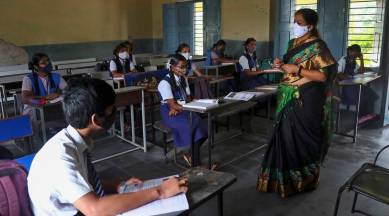Stay updated with the latest - Click here to follow us on Instagram
Muslim students most backward academically in Telangana residential schools for minorities: Study
The study, carried out by the Council for Social Development on behalf of the Telangana Planning Department, has looked at the Telangana Minority Residential Educational Institutions Society (TMREIS) which the state government set up in 2016-17, barely two years after receiving statehood.

Muslim students, especially those who have studied in Urdu medium schools or madrasas, are educationally more backward than those from other minority communities in Telangana, a recent study carried out by the state government on minority pupils studying in its residential schools has found.
The study, carried out by the Council for Social Development on behalf of the Telangana Planning Department, has looked at the Telangana Minority Residential Educational Institutions Society (TMREIS) which the state government set up in 2016-17, barely two years after receiving statehood. TMREIS was a part of the state’s Bangaru Telangana (Golden Telangana) project aiming at providing free education to economically backward communities – focusing on minorities, and Muslims in particular.
monthly limit of free stories.
with an Express account.
The study looks at 25 such minority residential schools in urban, semi-urban, and rural areas in Telangana. There are 204 such schools in the state.
“The Telangana government had identified that the position of minority students academically in the state was very low. In order to bridge the gap between the general students and minority students, it started this programme. We have seen that over the years, the enrolment in these schools has increased, indicating that more minority parents, who were earlier resistant to education, support education more now,” says the study’s author Ramshim Rahiman.
The study says that a child’s educational aspirations are “affected by class, caste, religion, gender, geographical location, region, family and parental attitude toward education”.
Among the communities that remain deprived of higher education, Muslims are the most deprived, it says adding that according to the 2011 census—despite being 14.2 per cent of the population—literacy levels among Muslims was 59.1 per cent, which is significantly lower than the national average of 64.8 per cent.
The earlier assumption about the Muslim community that it is a homogenous community, is not correct, points out Rahiman, saying that there are large regional differences and cultural groups among Muslims, which also influences the education level amongst the children in the community.
According to the Sachar report, 25 per cent of Muslim children aged 6-14 years have either not attended school or have dropped out. Children are usually forced to drop out due to poverty; 4 per cent of Muslims have completed graduation; only 2 per cent of Muslims have completed post-graduation. In many regions, especially urban India, Muslim education is far behind even Scheduled Caste and Schedule Tribe communities, the Sachar committee had said.
In Telangana, Muslims account for 12.68 per cent of the population (2011 census) and the literacy rate is 76.9 per cent.
“Enrolment of Muslim children in schools in Telangana is increasing, but we will need more data on this for us to unambiguously say this. Nevertheless, in Telangana the Muslim community registered the highest dropout and lowest performance in education,” says Rahiman.
According to the 2014 AISHE report, SC students comprised 13.4 per cent of higher education institutions, ST students 4.8 per cent and Other Backward Class (OBC) students 32.9 per cent. Muslim students were at the bottom of the ladder with 4.4 per cent of them in higher education institutions belonging to the community.
In Hyderabad, less than 2 per cent of Muslims comprise the economic elite, says the report, and 63 per cent belong to BPL families.
The 2017 Telangana Social Development Report finds that nearly half the Muslim population in the state lives in Hyderabad and whereas 32.6 per cent of Hindus live in urban areas, 74.6 per cent of Muslims live in urban areas. The monthly per capita expenditure in Hyderabad was the lowest among Muslims.
“We found that parents of 95 per cent of Muslim students come from poor backgrounds with parents who are either daily wagers or self-employed. These parents are unable to guide their children on matters of higher education which in turn affected the child’s pursuit of higher education. One of the most important factors that we have found in the study is that parental and family influence is vital for a child’s academic performance as well as longevity,” says Rahiman.
Rahiman adds that when the programme was started, teachers of these schools carried out a door-to-door campaign, but were met with hostility from the parents, and were often mistreated. The schools then reached out to the Muslim community through NGOs, madrasas, and mosques to increase enrolment.
The assessment has further found that while the schools have students from all minority backgrounds, and even from the general category, it was the Muslim students who were most educationally backward, especially in their initial years.
The study has also said that most of these students were either from madrasas or from Urdu medium schools. Studying in these schools till Class 5, most children did not have even a basic knowledge of English or Maths, says the report. Most Muslim students were also first-generation learners.
The study has found that the involvement of socio-economically backward Muslim parents in their children’s academic journey was also the least, with their interaction with teachers and the school being the lowest among the communities. They also had the least expectation from education and don’t link it with educational success. Most Muslim students at these residential schools would therefore opt for various vocational courses offered by the schools rather than academic courses.